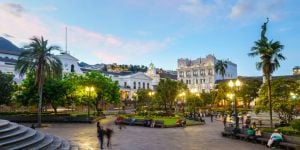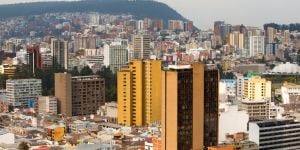Language barriers in Ecuador
Last activity 20 November 2018 by karenBH
1561 Views
22 replies
Subscribe to the topic
Post new topic
Hello,
Learning a new language is a part of the expat process. Let's find out how crucial it is to know the language in Ecuador.
What is the official language in Ecuador, and what are the other popular spoken languages?
Is it possible to live in Ecuador and get by without speaking the language?
How do you manage to communicate with the locals if you don't speak the native/official language fluently?
What are some popular and useful phrases that expats absolutely need to know?
Can you share some tips about how to survive in Ecuador on a daily basis without speaking the language?
Thank you for sharing your experience.
Priscilla
I've noticed I'm more likely to express my feelings with expressions of glee especially when the proper words escape my awareness momentarily. I'm more animated than I used to be. I am not fluent in Spanish however I do understand somethings. I tend to agree with anyone who speaks to me until I notice they're confused then I mirror that confusion. It probably frustrates the other person but I don't really mind. I'd generally rather listen and observe from the sidelines than be asked a bunch of questions. I can read body language better than many and I utilise this skill to overcome any challenges. Thanks for reading!!
I think knowing some Spanish is helpful. Or least travel with someone that does speak Spanish.
Heartwarming wrote:I am not fluent in Spanish.... I tend to agree with anyone who speaks to me until I notice they're confused, then I mirror that confusion. It probably frustrates the other person....
I'd generally rather listen and observe from the sidelines.... I can read body language... to overcome any challenges.
This is probably the most surprising method of coping in a small, obscure Ecuadorian town* of any method that I have ever read or heard of. 
I don't know how you do it, Heartwarming, even though I have read your post several times.
Please tell us more. Maybe your method can assist other Expats who also lack fluency in español.
cccmedia
*Gualaquiza is a town of about 8,000 people, 3 hours and 19 minutes northeast of Loja .. according to Wikipedia.
Not learning the language is arrogant and rude!
Dear Heartwarming,
I read body language well within my native culture but Ecuador has some differences as do all cultures!
My husband and I are working with a friend and Spanish speaker twice a week to improve our Spanish. I also agree that it is polite to learn the language of the country in which one lives. This also demonstrates respect.
As a retired teacher in the USA, I have worked with some parents and children that did not speak English. The most frustrating events were when the child or another person had to translate that the parents did not want to learn English for a variety of reasons. This lead to many parents and children being left out of very beneficial events at school and in the community.
My husband and I choose to engage in our community even with frequent faux pas.
Have a good day.
Robin
Rebecca and Robin found gentle words and concepts seeking to persuade Heartwarming to learn some español. 
The poster who insisted on no language 'rudeness' .. expressed a scolding attitude. 
Kudos to Rebecca and Robin for your restraint. 
cccmedia
Two years ago, a report about Cuenca’s expats was posted on this website. If I remember correctly, the findings concluded that most expats there didn’t speak Spanish nor were they inclined to assimilate. This is significant because it’s proof that there are many expats in Ecuador despite the language barrier.
I wouldn’t classify such expats negatively because to learn a foreign language requires will. Some people simply don’t have the will to learn a new language. I imagine that these expats stick to social circles that consist mainly of like-minded people.
Personally, I’m fully immersing with society. Communicating in Spanish is making me less of a foreigner, and I like that. My first year here, I needed my bilingual best friend to accomplish many things. Now, my social life is almost completely with native-speakers. I volunteer; enjoy Latino music (actual lyrics), poetry, TV shows, etc.
I love learning languages. I practice Spanish every day. I am thinking of picking up some Kichwa in the future.
Sorry for my thesis. Just seems like in the previous post the reality and depth of poqito espanol was barely scratching the surface.
I am learning espanol as fast as I can. Which is not fast enough. I am pleased to say I can get into a taxi and tell them where I want to go and they understand. That was a huge problem in the beginning. Google translate helps fill in some of the time. But dating does not work well with a translator.
Coming to Cuenca alone has been difficult. I know a few people, and try to drag myself out of my house to go to places to meet people. I am a little shy, do not drink, dance or like loud music...So much for my youth of sex, drugs, and rock and roll.
I am an artist and would love to go to art events, but I do not see or hear about very many. I like to go out to dinner, but that is not very exciting to do by myself.
I was going out with a Cuencana woman for a while and it was mostly fun. Unfortunately she thought of me as the father she never had, and wanted me to buy her things all the time, and her communication skills amounted to I WANT, BUY ME, TAKE ME AND MY CHILDREN TO..... no mas chica loca.
The worst language barrier seems to be at Coral. No one speaks english, and even if you show them an image of something on a phone they don't seem to understand. Where is red ribbon, pillows, anything...they do not comprehend. But then really, the pillows at Coral Central are in automotive? No wonder the people who are in sheets and towels cant tell you where a pillow is.
With poquito espanol and a smart phone I can get what I need. I will get past the struggle, and thrive. I am from the generation of I want what I want when I want it. I am very smart, patient, and committed. But I am having to learn tolerance, acceptance and let it go, and some things are simply not within the reality of a third world country.
I am also used to searching the web, or ordering from Amazon. I bought a very cool phone here. But there are no hard cases available here. Finally ordered them through amazon, shipped to my mail forwarder, who sent them to me C/O FEDEX, hold for pickup. What else do you do when street numbers in this country are apparently not necessary? But the cost? I ordered 1 case at $8.95 and 1 case at $9.95. Fedex $90. Ecuadorian taxes, and God only knows what all these other charges are for $30.40. Yikes. I do not know enough Spanish to figure out how to find many things here, or ask, or call. Clearly, I cannot resort to Amazon.
If I were fluent in espanol, it would be easier.
Taipan510, I would encourage you to get involved with volunteer organizations in Cuenca, specifically those where you would be forced to use Spanish while doing some good for others and yourself. You could volunteer once a week or on almost any schedule you wanted.
There are food banks:
https://bacuenca.org/voluntariado/nuestros-voluntarios
stray animals/animal shelters:
http://www.cuencanimal.com/
BioPark of Cuenca:
http://www.zoobioparqueamaru.com/webs/v … antias.php
hospital:
http://www.institutodelcancer.med.ec/voluntariado/
And there are many more you'll find in the above categories and more just doing a search for
cuenca voluntarios
I guarantee your Spanish would improve quickly and dramatically and you would be doing worthwhile service!
This is a response to Taipan's positively detailed post. I appreciate very much your sense of humor. Humor and laughter are good stress relievers. What surprised me is your thinking that Ecuador is a third-world country and what appears to be your assumption that others also think and experience Ecuador as third-world. For me, Ecuador is light-years ahead of the United States in such areas as universal health care. Ecuador is also light-years ahead of the U.S. in the Ecuadorians use of public transportation that keeps down the number of private vehicles on the streets and, therefore, the amount of pollution and other traffic-related problems. My husband's primary language is Spanish. He has a college degree from a Ecuadorian university. He is a professional. In addition, his English is better than mine, his grammar and syntax are also better than mine. His vocabulary in both Spanish and English is enormous. One of the difficulties that I have with understanding his use of Spanish is the natural (fast, in my opinion!) rate of speed he uses. He says that I need to "get used to" the normal rate of speed that Latino-Americans speak Spanish. Maybe so. However, the way for me to actually move my Spanish usage from intermediate to fluent is with a Spanish teacher who understands my vocabulary and level of my use of the Spanish language. I have a service-connected (U. S. Army), bilateral hearing deficit. I wear a hearing aid in each ear. I am much more of a visual learner than an auditory learner. Even in my primary language of English, I don't understand everything that's being said. So, my hearing deficit multiplies, compounds, my difficulties in learning the primary language of my husband. (I have problems IN ENGLISH! "getting" consonants at the beginnings and endings of words. Can you imagine my problems with Spanish?) What I've also noticed, however, is the native speakers of Spanish always brighten up when they see and hear a gringo (like me with my white, northern-European skin standing out like a sore thumb!) attempting to speak their beautiful language. Their eyes shine brighter and their faces become 100% smiles. One Ecuadorian man who didn't understand nor speak any English told me (in Spanish, of course) that he was impressed with me speaking with him in his native tongue, no matter that I wasn't doing so in anywhere near fluency. He told me that he thinks that ex-pats miss a lot and their experiences could be so much broader and deeper by learning and using Spanish with the potential to experience a culture and a society that's different from our own. By the way, he would stop speaking, from time-to-time, and ask me if I understood what he was saying. Whenever I said, "no," he would work with me and my Spanish by re-wording whatever he wanted me to understand. I can tell you, as "an Okie from Muskogee," that I was proud and pleased when he told me, (in Spanish, of course) "You'll be fluent in Spanish in three or so months, if you keep at it, John." (smiles-sonrisas)
Coxhere wrote:However, the way for me to actually move my Spanish usage from intermediate to fluent is with a Spanish teacher who understands my vocabulary and level of my use of the Spanish language.
One economic option for you is to hire a Spanish teacher from one of the local institutes. You can probably find one for about $8-$10 per one hour of one-on-one instruction. They do this via Skype.
Can you help me to locate one? A Spanish teacher from one of the institutes of which you referred? Thanks!
Coxhere wrote:Can you help me to locate one? A Spanish teacher from one of the institutes of which you referred? Thanks!
Coxhere, check your personal messages.
That's great Coxhere. Even I can appreciate your attempts at learning the language. I understand that not everyone will have the same desire and motivation to really commit to learning Spanish, as it is not something that will happen overnight, so you really do need that motivation and commitment, to make it work.
However, I can't imagine living in Ecuador without speaking Spanish. I don't live in Cuenca, but a small town on the north coast called Canoa. We also have a fairly large expat community here and while I love spending time with like-minded expats, what has really changed me as a person (for the better) and enriched my life, is learning the language and speaking with the locals. In many cases they do have a different mentality than us, and I learn so much from them!
Despite learning Spanish in highschool (and aceing it!) and taking an intensive 30 day program + homestay in Costa Rica, I could not hold a conversation when I got to Ecuador. It was extremely frustrating for me and in many cases, lonely. I am so glad that I later made the effort to really learn the language because it has literally changed my life. I now have many Ecuadorian friends, I have received several job opportunities because I am fluent, I am fully self-reliant and independent with anyone I need to get done, etc.
There are people who get by with a very basic level while living here, and while I do not judge, I can see that they are missing out and I think they know it. It hurts me to see them sitting silently without a clue of what is going on in social events, etc.
I think many people believe that they are not good with languages, too old, or just won't be able to ever speak the language fluently, for one reason or another. This is likely due to a number of reasons such as past events and limiting beliefs, but let me tell you that whatever excuse you are telling yourself, it is not true. You can learn Spanish and anyone can. Your past track record doesn't matter. All you need to do is find the motivation to commit to making it happen, and use the right strategies.
I now help other English speakers become fluent in Spanish through neurolanguage coaching and conversation practice with native speakers. We use neuroscience to learn about how the brain naturally comprehends new concepts, so that we can facilitate the process and accelerate the results, and it's amazing what our learners have been achieving!
Recent neuroscience studies have revealed that brain plasticity continues into the later years in life, up until the day we die, actually. So no matter where you are in life, you can train your brain to form new neural pathways that help assimilate new concepts and increase memory.
Don't give up! You can live a more fulfilling life in Ecuador and stop feeling like an outsider if you learn Spanish. You only live once!
I speak Spanish but not Quechua, wish that I did. What I find sad are the many extranjeros living in and around Vilcabamba who do not bother to learn the language and do not feel that they need to do so. They are really not part of the community and never will be. Generally, speaking 2 languages makes it easier to accommodate to a third, etc. , e.g. if you speak English and French then Italian or Spanish is easier to learn.
helenp
HelenPivoine wrote:
if you speak English and French then Italian or Spanish is easier to learn.
That one makes me laugh, Helen. I keep inserting French irregular verbs (properly conjugated, of course) into my Spanish sentences throwing my listeners off completely. I'm OK with nouns and adjectives, but French verbs just seem to pop into my head more readily than the more recently learned Spanish ones. It took a high school French teacher to catch me doing that and calling it to my attention.
DorothyPeck, your comment makes me remember a situation during a Spanish class at the University of Maryland's Far East Division in Okinawa way back in 1967-1969. I was stationed in Okinawa and was going to night school. Anyway, I got tongue-tied because I was confusing and trying to mix my high school LATIN! into a response that I was trying to make in Spanish when our professor had asked me a question. Maybe the word, stutter, would be a better descriptor than the word, tongue-tied. I remember as if it were yesterday: Everybody in the class----me included----busted out laughing at my Latin-Spanish stuttering. Then, we laughed some more after I explained what I thought was the explanation for my problem. (smile)
Dorothy,
You sound like a fun person, too bad that you are far away. OK, I admit that I now have a new problem, when I open my mouth to converse in French with someone, out pops Spanish, my brain is confused it seems. I worked in French only for 25 years, seems strange that brain is playing tricks on me.
Europeans seem to have no trouble with 5 or more languages, so cool. I once met a guy who spoke 7, phew.
Helenp
Nadineftp, I'm reading once again and a year later your November 2017 post. You wrote that it hurts to see ex-pats who "don't have a clue" as to what's being said when with a group of folks who are speaking Spanish. Living in Ecuador and having no grasp of the Spanish language is a "handicap."
Well, with a service-connected, bilateral hearing deficit incurred while a volunteer, enlisted U. S. Army soldier back when the U. S. still had the draft and our unnecessary war in Southeast Asia that killed over 58,000 young Americans and countless, Southeast Asian natives, I have a "handicap" and it doesn't matter what language is being spoken. I've stopped asking for things to be repeated because I couldn't hear nor comprehend what was being said. And this includes times when I am solely with family members who know that I don't hear like "normal" people. My asking for a repeat interrupts the natural flow of conversation. Asking what is said is annoying, frustrating, and disrupting to the thinking that's generated by those who can hear and, therefore, understand the sounds of word usage. So, I just sit and smile. During their conversations I am sometimes addressed but, because I've "checked out," I don't know that they are, all of a sudden, talking to me.
Regardless of what could be used as an "excuse" for not trying to learn Spanish----a legitimate, hearing disability----I'm trying doubly hard to "get Spanish" as best I can with my given limitations. One of the things that I'm discovering and "getting" is my increasing skills at "guessing" correctly a Spanish equivalent word for an English one because of my familiarity with Latin that I learned over four semesters, eons ago in high school. With many words, English and Spanish both have words that come to us from Latin roots. The interesting part, at least I think it's interesting, is that I "get" a better and better idea as to sounds of words being (or existing) in the Spanish language.
I'm not describing very well what I'm thinking and what I'm am wanting to communicate. Here's another attempt: The more that I learn Spanish and am more familiar with just Spanish word-sounds, the more accurate are my "guesses" that various, additional words exist in and are a part of Spanish. Even a year ago, I wasn't as able to do this as I am able to figure out Spanish words today via "guessing." Surely, this has to be, in part, because of my greater and greater familiarity with and correct use of the beautiful, Romance Language called, "SPANISH!"
Have you tried learning Spanish online Coxhere? With the headphones in an being able to adjust the volume etc., I have a feeling that may be more efficient for you 
Articles to help you in your expat project in Ecuador
 Food in Ecuador
Food in EcuadorWhat kind of food will you find in restaurants, cafes, and private homes in Ecuador? Many restaurants in Ecuador ...
 Work in Ecuador
Work in EcuadorEcuador is famous as a retirement haven. But you might not want to wait until retirement age to move there and ...
 Family and children in Ecuador
Family and children in EcuadorFamily is everything to an Ecuadorian. The extended family unit is the most important aspect of life in Ecuador, ...
 Opening a bank account in Ecuador
Opening a bank account in EcuadorA few years back, an expat would just breeze into an Ecuadorian bank, flash their passport and a bank account ...
 Healthcare in Ecuador
Healthcare in EcuadorEcuador, as a fast-developing nation, has laws that are constantly evolving, but one thing is certain: the ongoing ...
 The Working Holiday Visa for Ecuador
The Working Holiday Visa for EcuadorEcuador is truly a paradise for adventure and nature lovers, and thanks to the Working Holiday Visa program, they ...
 Leisure activities in Ecuador
Leisure activities in EcuadorYou have made it to Ecuador, now what is there to do in your free time? A lifetime in Ecuador isn't enough time to ...
 Permanent Residency in Ecuador
Permanent Residency in EcuadorEcuador is calling and you are ready to go and experience all that this gorgeous country has to offer. However, ...
Find more topics on the Ecuador forum



